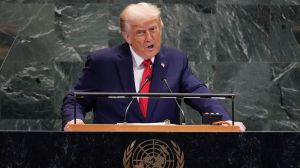That winning feeling…For Bangla, it was worth the wait
It took a while, and was achieved against a side clawing their way back from suspension after being declared too weak for Test cricket. No m...

It took a while, and was achieved against a side clawing their way back from suspension after being declared too weak for Test cricket. No matter. Nobody in Bangladesh cared a jot on Monday as the country began celebrating the first major victory of their short history. Thousands, armed with drums and flags, ran onto the streets in Dhaka within minutes of the end of the game to hail a 226-run win over Zimbabwe. Traffic came to a halt and nobody seemed to care.
Bangladesh coach Dav Whatmore, the former Australia Test batsman, was among those celebrating. In 1996, he had led Sri Lanka to the World Cup title. Monday completed a remarkable Asian double for him.
It was also a well-deserved success for captain Habibul Bashar, who averages a creditable 35.73 in 33 Tests. ‘‘It’s the best day in my life,’’ he said. ‘‘I won’t forget the day I was a member of Bangladesh’s winning team.’’
It had seemed only a matter of time before Bangladesh would begin to compete after becoming the cricketing world’s 10th Test nation in 2000. Unlike many of their rivals, they had a 130 million-population to call on.
Their first outing against India in November 2000 promised much as they made 400 in their first innings. A total of 91 in the second, however, dampened optimism as they lost by nine wickets.
They took on Zimbabwe, the sport’s weakest side until then, in their next match and lost by an innings and 32 runs. In their next series they failed to reach 150 in either innings of the first Test against Pakistan, while five players made centuries against them.
There were consolations, however, including a debut century by Mohammad Ashraful against Sri Lanka — it was a day before his 17th birthday, according to some sources, and 63 days after according to others.
After six defeats in a row, they were saved by the rain in their first draw, against Zimbabwe in Dhaka in November 2001, before reverting to type.
|
Man of the match
|
|||||
|
He has been around for a while, and though just 18, Enamul Haque Jr did play three Tests with little or no distinction before taking Bangladesh to victory at Chittagong today. Rated highly by Dav Whatmore, who reckons Enamul would be the ideal replacement for Mohammad Rafique once the veteran calls it a day, the left-arm spinner was also a big part of the team that won the Plate Championship at the 2003 U-19 World Cup. |
|||||
Against South Africa in the first Test in East London towards the end of 2002, they watched Graeme Smith make 200 on his debut. In the return series, Jacques Rudolph made 222 not out in his first Test. At the end of 2002, West Indian right-arm fast bowler Jermaine Lawson took six for three against them in 6.5 overs as they were bowled out for 87.
They at last came close to victory in Multan the following year, however, when it took an unbeaten century from Inzamam-ul Haq to sneak Pakistan home by a single wicket to complete a 3-0 whitewash.
West Indies, too, were made to labour in a draw in St Lucia early last year when Habibul Bashar, Mohammad Rafique and Khaled Mashud all scored centuries for Bangladesh.
The team hold some unenviable records, including an unprecedented 21 Test defeats in a row to go with 47 one-day internationals without a win.
But Monday meant that their run of 34 Tests without victory fell short of New Zealand’s record of 44 consecutive games between 1930 and 1956.
By comparison, what’s four or five years? A mere blink of the eye. So what if Zimbabwe, without their top players after a selection revolt, are not the team they once were? Nor, Bangladesh will hope, are they. (Reuters)
BRIEF SCORES
Bangladesh:
488 all out & 204 for 9 decl beat Zimbabwe: 312 all out & 154 all out (H Masakadza 56, B Taylor 44; Enamul Haque Jr 6/45, T Baisya 2/20, M Mortaza 2/45)
Result: Bangladesh won by 226 runs
Second Test starts Jan 14 in Dhaka
Photos



- 01
- 02
- 03
- 04
- 05




























